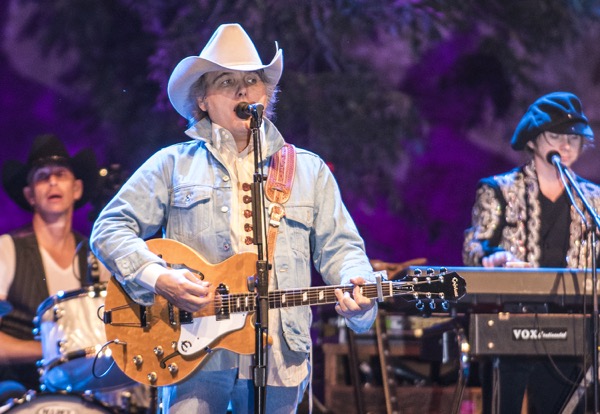
A rock-and-roll sleigh ride in cowboy boots—“Run Run Rudolph” lets Dwight Yoakam turbocharge a Christmas classic with Bakersfield snap and bar-band joy, the sound of a honky-tonk opening its doors to December.
Key facts first. Yoakam’s “Run Run Rudolph” is the second track on his holiday LP Come On Christmas, released by Reprise on August 26, 1997. It runs right about 3:10, carries the standard writer credits to Johnny Marks and Marvin Brodie, and—like most of the album—was not worked as a single (the only charting 45 from the set was “Santa Claus Is Back in Town,” which reached No. 60 country). The album itself peaked at No. 32 on Billboard’s Top Country Albums.
The song Yoakam is revving here has sturdy bones. First cut by Chuck Berry in 1958 (often titled “Run Rudolph Run”), the tune’s authorship has long been credited to Marks/Brodie—a matter of publishing and Rudolph-trademark logistics—but it’s Berry’s original that set the template: a 12-bar sprint built for jukeboxes and chrome. Berry’s version eventually became a seasonal standard, even reentering the U.S. charts decades later; every credible cover, including Yoakam’s, follows the Marks/Brodie credit line.
What Yoakam brings is feel. With producer-guitarist Pete Anderson at the helm, the band keeps the arrangement lean and road-ready: dry drums pushing straight ahead, bass walking with purpose, Telecasters chattering in tight figures, a touch of baritone warmth at the edges. On paper it’s a Christmas cover; on record it’s a dance-floor starter with tinsel on the headstock. The performance sits right in Yoakam’s wheelhouse—Bakersfield bright but never brittle, country at heart with a rockabilly kick that makes the chorus feel like a green-light at the lightest touch of the pedal. (The album’s personnel list reads like a West Coast A-team—Pete Anderson on guitars, Jim Christie on drums, Skip Edwards on keys, Taras Prodaniuk on bass—players who know how to swing without clutter.)
Part of the fun is how he sings it. Yoakam leans into the lyric like a man grinning at a familiar story—half Santa sprint, half Saturday-night brag. He doesn’t re-sculpt the melody so much as tighten it, trimming any slack so the lines pop off the beat. Where Berry’s cut felt like a street race through slushy Chicago, Yoakam’s version sounds like a dust-clear night outside Bakersfield, neon blinking, boots stomping, the band counting off just fast enough to keep the room moving. That little shift in climate—Gulf-coast R&B sped through a California honky-tonk—explains why his take sits so naturally in sets that otherwise feature chestnuts like “Silver Bells” and “Silent Night.”
And yet there’s warmth under the horsepower. One reason the track keeps circulating every December is that Yoakam understands what makes these seasonal rockers last: cheer without corn, swagger without sneer. He hangs back from irony and lets the groove do the smiling. The guitars sparkle just enough, the backbeat keeps its shoulders down, and the vocal rides on top with that high, easy tenor that’s weathered but still bright. You can put this on in a kitchen full of cousins and it won’t clear the room; it will gather it.
Within Come On Christmas, the cut plays a strategic role. The album balances reverent readings (“I’ll Be Home for Christmas,” “Silent Night”), a Yoakam original or two, and jukebox-ready stompers. Dropping “Run Run Rudolph” in the two-slot is a sequencing wink: first the welcome mat (“Come On Christmas”), then the party starts. It’s also the place where the record declares its intentions—this won’t be a museum tour of carols; it will be a country record that happens to be about Christmas, made by players who can swing a room no matter the month.
For listeners of a certain age, the meaning of Yoakam’s version is less about Santa’s logistics than about seasonal muscle memory. It sounds like driving home from a late shift on December roads; like finishing the last pan in the sink while the house hums; like putting one more leaf in the dining table and deciding—again—to make room. The lyric’s candy-cane chase becomes a little sermon on momentum: keep moving; keep the lights on; let joy be loud enough to hear from the street.
And for the discography-minded, the markers are tidy and reassuring: Come On Christmas (Reprise, August 26, 1997), track 2, 3:10 runtime, Marks/Brodie credit, album peak No. 32 on Top Country Albums, no single push for this cut. It’s a seasonal B-12 shot tucked inside a warm, well-played holiday set—Dwight Yoakam doing what he’s always done best: taking familiar American music, trimming it to the bone, and playing it with enough heart that even December feels like Saturday night